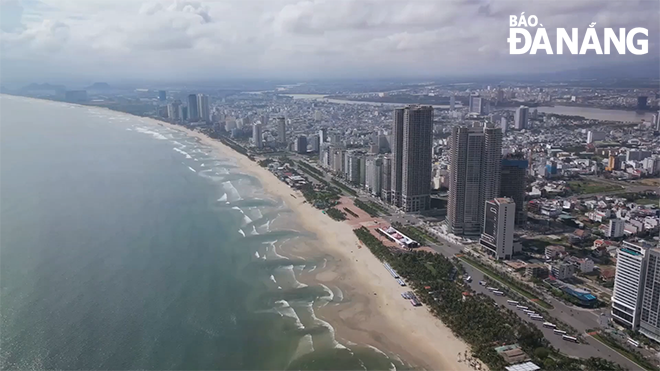Training human resources for high-speed railway industry
To implement the North-South high-speed railway project, human resource preparation is very important. Therefore, a number of universities nationwide have taken the initiative to open new majors, innovate training activities, and access modern technology in a bid to meet human resource requirements.
 |
| The University of Science and Technology - the University of Da Nang plans to open a major in Railway - Metro Construction under the Department of Transport Construction Engineering and enroll students starting from the 2025-2026 school year. IN PHOTO: Enrollment activities for training majors of the University of Science and Technology. Photo: THU HA |
On November 30, 2024, the National Assembly of Viet Nam approved the investment policy for the high-speed railway project on the North-South axis, passing through 20 provinces and cities nationwide with a total length of about 1,541km. The purpose of the project is to satisfy the increasing transportation needs, promote socio-economic development, effectively connecte economic regions, and ensure national defence and security.
As planned, the project will be carried out in 2027 and its first phase is expected to be completed in 2035. According to the pre-feasibility study report, the North-South high-speed railway project will need about 13,880 workers, around 20% of them are required to have university degrees or higher (more than 2,500 engineers).
The construction sector has the largest demand for human resources, with 220,000 - 240,000 people, including 18,000 - 20,000 engineers, of which 20 - 30% are engineers specialising in railway construction.
Grasping this need, the University of Science and Technology - the University of Da Nang plans to open a major in Railway-Metro Construction under the Traffic Construction Engineering and enroll students from 2025.
The general goal of the major is to train students to have comprehensive professional knowledge in the field of traffic construction, especially in high-speed railway construction, urban railway and metro tunnel construction; have interdisciplinary scientific and technical knowledge in construction; have good knowledge of construction management and effective implementation of industrial projects; and have professional skills in specialised fields suitable for the requirements of digital transformation towards green and sustainable development.
Notably, graduates are guaranteed to have the ability to apply basic scientific knowledge, and specialized expertise to solve problems in planning, design, construction, management, exploitation, testing and maintenance of traffic works, especially high-speed railways, urban railways and metro tunnels. They will be capable of combining interdisciplinary construction sciences to form effective design, construction, organization, management and administration ideas for high-speed railway projects, urban railways and metro tunnels in line with the context of the society.
Assoc. Prof. Dr. Nguyen Hong Hai, Vice Principal of the University of Science and Technology said that the preparatory works for the high-speed railway project, especially in terms of human resources, is as urgent as investing in the field of microchips and semiconductors. The university is training 37 majors/specialisations, including mechanics - traffic mechanics, computer and information technology, electricity - electronics, architecture - construction - project management, chemistry, environment. It also ensures sufficient resources and conditions for training in order to provide human resources for the railway industry.
 |
| To prepare for training human resources for the high-speed railway industry, the University of Science and Technology - the University of Da Nang organized a specialised workshop to exchange and discuss this issue. Photo: THU HA |
In addition to opening the railway - metro major which is expected to enroll in 2025, the university will change the training method to suit the current urgent requirements, add short-term training courses, and supplement and improve timely skills for learners in order to help students quickly catch up with job positions.
The railway industry, especially high-speed railways and urban railways, is a specialised training industry, related to many majors such as construction, vehicles, electrification, signal information, and operation.
Up to now, there have been four higher education institutions nationwide opening training majors in the field of railway - metro construction. They are the University of Transport, the Ho Chi Minh City University of Transport, the Ha Noi University of Construction and the University of Transport Technology.
According to Mr. Dang Xuan Thuy from the Railway Investment and Construction Consulting Joint Stock Company, Viet Nam is developing an urban railway system (metro/subway) and aiming to develop a high-speed railway system, which requires human resources with in-depth knowledge and appropriate practical skills.
He also stresses the need for a modern training programme to train human resources for high-speed railways. He also highlights a close combination between universities and enterprises, and the application of modern technology and international integration. He underlines the must-do for training institutions to have a strategic orientation programme for training human resources suitable to the practical conditions of Viet Nam.
Specialised universities need to research and develop training programmes to meet the needs of Vietnamese enterprises and practices; and build teaching facilities and supplement teachers with in-depth knowledge of the urban railway and high-speed railway fields. The combination of theory teaching, practice, business cooperation and technology application will help students have a solid foundation and be ready to meet the development demands of the high-speed railway industry in Viet Nam.
Reporting by THU HA - Translating by M.DUNG








